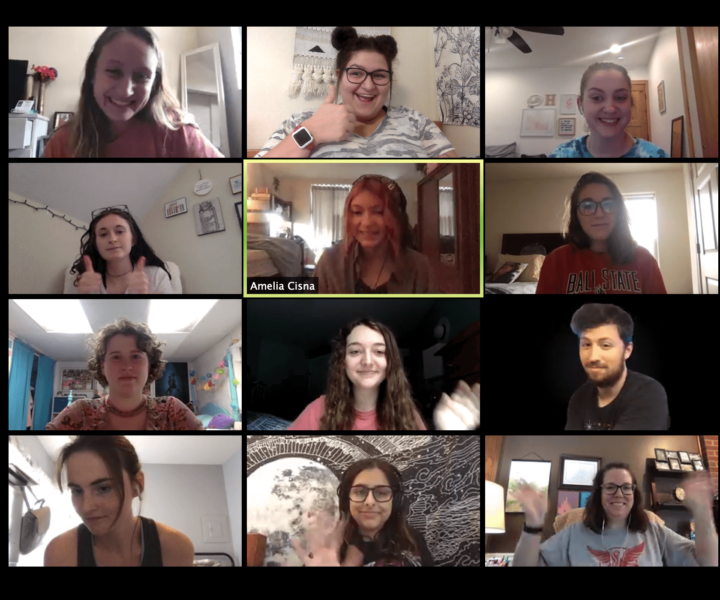
You’re never going to want to do that thing. You know that thing… the one you have been pushing off? The one that you are waiting to complete only when it is the perfect time to do it? Yeah, you’re never going to want to do it. That perfect time isn’t coming.
You’re never going to want to do those dishes that have been sitting in the sink for the past week. You’re not going to want to do the laundry that has now amounted to about six loads. And that most recent assignment you got? That’s definitely not something you want to do. But the sink needs to be cleared, clean underwear is a necessity, and you need to turn in your assignment.
You might tell yourself that right now just isn’t the right time. Maybe Sundays are your day for watching that one show. Or maybe tonight you just want to relax. Maybe you’re waiting for that periodic burst of productivity you get. And while relaxing and taking time to indulge in the newest show or just ingest some fun media is important, it’s also just as important to get your to-do list completed.
Let’s look at the root of our procrastination.
What keeps us from finishing what we signed up to do?
It can be extremely difficult to navigate life through its twists and turns and simultaneously keep up the motivation to keep up with responsibilities. Many of the tasks we push off are pushed off for a reason. They can be hard, frustrating, monotonous, and just, in general, do not necessarily give our brain a release of immediate dopamine that the alternative task may give us.
For some background, an article was released at University of Texas Permian Basin that talks about how dopamine works:
“Commonly referred to as the “feel-good” hormone, dopamine is the brain’s major reward and pleasure neurotransmitter. Anything that causes pleasure triggers a dopamine release. While it’s a common misconception that dopamine makes you happy, the hormone actually reinforces behaviors that make you happy.
Smartphones are so addictive because every time we use them—to like an Instagram post, watch a YouTube video, or play Wordle—it triggers a surge of dopamine. After an initial rush of dopamine, there’s a dip like a craving: What goes up must come down. If a person isn’t addicted, the craving passes, but if they continue binging, the brain compensates with lower and lower dips.”

Let’s put it into perspective:
Maybe it’s been a few weeks since you did a deep clean of your house/apartment/room/dorm/etc. While you know it’s going to feel amazing after it is clean, it’s going to take hours to just get started; separating dirty clothes from clean, unloading the dishwasher, sweeping, mopping, don’t even mention the idea of dusting.
It’s going to be hard work to really make the place feel clean. And you have already gone to school/work or used your metaphorical battery on a lot of other things this week. So, when you see your bed all you want to do is lay down and watch an episode of your show or doomscroll through the latest social media trend. And that is completely understandable.
It’s going to take all day to get the dopamine you feel after your environment is finally clean. But if you lay in bed, you can get quick, short-term dopamine flowing into your brain within seconds. So, yeah, why wouldn’t you want to pick the option that is going to make you feel happier faster?
This problem affects almost everybody. Finding motivation to complete hard tasks only gets harder as quick dopamine gets more easily accessible via the internet and fast-moving media.
In fact, finding motivation to finish assignments is one of the biggest problems students are facing across the country.
In a study completed by Ball State University’s Division of Online and Strategic Learning, they found that 71% of students struggle with finding motivation to complete their assignments. If so many people struggle with finding motivation, why haven’t we found the solution? That’s because the answer to this problem is complex and not “one size fits all.”
Some people need a reward system; others try to think of the consequences that lie ahead if they don’t finish it. But at the end of the day the main consensus is, “You’re never going to want to do something, just do it anyways.”
How do you, “Do it anyways?”

As you may already know, this is much, much easier said than done. To accomplish this, you must first understand when your brain is looking for unnecessary rest or quick dopamine and then push those thoughts away and be productive instead. You have to fight your brain on what it wants. It’s like a really complicated game that you are definitely not meant to win. When you practice this and find the ways that work best for you, this way of thinking gets easier. Truly! But it takes a lot of time and trial and error to get started.
First, this would be a good time to start understanding how you operate when it comes to task completion.
- Do you do well with to-do lists?
- How are you managing your time?
- Are you separating work and relaxation?
- What keeps you going?
Sit down and think about some different times you accomplished tasks effectively.
- What time of day did you work on them?
- How long did this task take?
- What was your environment like?
- What worked really well, what worked not so well?
Do the same and think about some times when you just could not keep going on whatever you were working on.
- What kept you from getting it finished?
- What kept you away from getting started?
Do some thinking and find some patterns in your past workflows.
- Are you finding that you have a hard time starting a new project?
- Can’t keep the motivation to continue working on it?
- Push it off and do a poor job all at once before the deadline?
- Get distracted easily?
We all have our errors when it comes to how we work on things. This trouble shooting can help us see where we need to do better in our personal processes.
Now that you understand where your problems might land, do some research on what you can do to improve this trouble area. Look online to see what works for others that have similar issues.
You can also see what some of our Corps employees do to work on the areas they need to improve:

Laura Latham | When you need to find motivation to keep going:
“When I need to get something done, I like to use a reward system. So, I sit down to work and after I get something done, I get to have a small, sweet treat. This gives me the incentive to keep going and gets me excited to continue my work.”
Emily Otero | When you need to find motivation to do something you really don’t want to do:
“First, let out a scream. Then just do it.”


Parker Offhaus | When you need to prioritize time:
“When I know I need to work on a big project that I want to put some real effort into, I will block off time in my calendar to specifically work on it, then I’ll throw my phone away from me or something.”
Kenzie Gamlin | When you need to find motivation to start:
“For about four months, I was talking (relentlessly) to my therapist about motivation and procrastination. With the combination of heavy distractions, forgetfulness, and years of procrastination practice, I had a really hard time completing tasks from start to finish. After telling this to my therapist she gave me tactics to help. The main one, that I think about every day, is, ‘do it the moment you think about it.’ Don’t waste time, don’t throw it on a to-do list, just do it. It sounds so simple, but it really has changed my productivity levels and has pushed me to do more in my days than I ever have before. Oftentimes once I just started something, I would get so much more done than I would have ever expected.”


Josh Pavlovsky | When you need motivation to get it done:
“I am historically a procrastinator. I didn’t do great in high school about working this out and during my undergrad I had to completely rework my brain process. So, now I repeat this phrase to myself: ‘Do it now, so you don’t have to do it later.’ If I push it off and wait to do it later, not only will I have that, but I will also have whatever is new to do. Then I will have way too much to do and then won’t do any of it at all.”
All sorts of different tactics work for different people. But at the end of the day, you’re never going to want to do the task that you have been pushing off. So, just do it.



